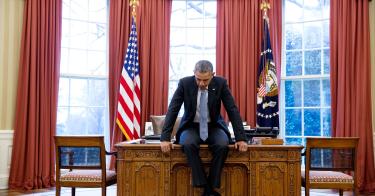If true, it’s extremely troubling.
I’m referring to the explosive Politico investigative piece, “The secret backstory on how Obama let Hezbollah off the hook,” published this week. While not uplifting, it’s a worthy holiday read.
Without spoiling it, the fascinating story alleges that the Obama administration stonewalled a law enforcement program known as “Project Cassandra,” and failed to deliver some serious body blows to Hezbollah because of its bid to get Iran into — and to stay in — the 2016 nuclear deal.
OK, so what’s wrong with that? Plenty.
The article claims that Hezbollah was involved in a vast global criminal enterprise, including drug trafficking to the United States, that may have generated as much as $1 billion a year in revenue for its cause.
That’s a big problem.
Even putting aside the evils of drug trafficking, that’s a lot of cash finding its way into the pockets of a bad-to-the-bone foreign terrorist organization — which has the U.S. in its crosshairs.
Remember the havoc ISIS wreaked when it was able to sell beaucoup barrels of oil on the black market? It paid for a terrorist army that came to control large swaths of Iraqi and Syrian territory, putting millions under its Islamist control.
Hezbollah is one of the most notorious, most capable terrorist organizations in the world today — in the big leagues with the likes of ISIS and al-Qaeda.
It may be best known here for its attack on the Marine barracks and the U.S. embassy in Beirut in 1983, which took more than 300 lives. The “Party of God” also bombed a Jewish community center in Buenos Aires in 1994.
Hezbollah has fought with Israel any number of times. It destabilizes its homeland, Lebanon, with violence, supports Shiite militias in Iraq, the rebels in Yemen and the Bashar Assad regime in Syria.
It has long been active in this hemisphere, too. Hezbollah was particularly welcome in Venezuela during President Hugo Chavez’s times. It’s believed that Hezbollah retains plans for attacking the U.S.; indeed, in June, two operatives were arrested here.
The Shiite militant group has also been implicated in an attack in Bulgaria and plots in Thailand, Cyprus, Azerbaijan and Peru.
It’s supported by — and supports — Iran.
As bad as all that is, the Obama administration’s decision to go easy on Hezbollah’s money-making operations looks worse, considering the controversial results of the nuclear deal with Tehran.
Recall: The pact leaves Iran as a threshold nuclear state, has a “sunset clause” that limits the length of the agreement’s restrictions, allows Iran to continue uranium-enriching centrifuge research and has holes in its verification procedures.
Even though some defenders of the Obama administration’s decisions on Hezbollah in the article point out that there were bigger policy goals to consider — for example, concluding the Iran nuclear deal — we still need to know more.
But while we wait for an explanation from the previous administration we doubt will ever come, it seems Team Trump is changing course drastically toward a tougher line on Iran and its proxies, including Hezbollah. That switch comes not a moment too soon.
This piece originally appeared in The Boston Herald



